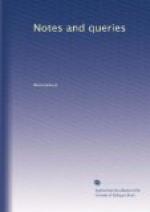“In valem Egeriae descendimus, et speluncas
Dissimiles veris. Quanto praestantius esset
Numen aquae, viridi si margine clauderet undas
Herba, nec ingenuum violarent marmora tophum?”
Sat. iii. 17.
In imitating this passage, Mr. Rhodes, finding no fons Egeriae, no Numa, and perhaps no Muses in London, transfers his regrets from a rivulet to a navigable stream; and makes the whole ridiculous, by suggesting that the Thames would look infinitely better if it flowed through grass, as every ordinary brook would do.
“Next he departed to the river side,
Crowded with buildings, tow’ring in their pride.
How much, much better would this river look,
Flowing ’twixt grass, like every other brook,
If native sand its tedious course beguil’d,
Nor any foreign ornament defil’d.”
W (1.)
* * * * *
Dedication to Milton by Antonio Malatesti.
Dr. Todd, in his Life of Milton, ed. 1826, mentions the accidental discovery of a manuscript by Antonio Malatesti, bearing the following title:
“La Tina Equivoci Rusticali di Antonio Malatesti, c[=o]posti nella sua Villa di Taiano il Settembre dell’ Anno 1637. Sonetti Cinqu[=a]nta. Dedicati al’ III’mo Signore et Padrone Oss’mo Signor Giovanni Milton, Nobil’ Inghilese.”
It seems that this Ms. had been presented, together with Milton’s works, to the Academy della Crusca, by Mr. Brand Hollis, but had by some chance again found its way to England, and was sold by auction at Evans’s some short time before Mr. Todd published this second edition of Milton’s Life.
I know not if there has been any further notice of this Ms., which is interesting as a monument of the respect and attention our great poet received from the most distinguished literary men of Italy at the time of his visit, and I should be glad if any of your correspondents can indicate its existence, {147} and the place where it is now preserved. When it was on sale, I had permission to copy the title and a few of the sonnets, which were such as we could not imagine would have given pleasure to the chaste mind of Milton; each of them containing, as the title indicates, an equivoque, which would bear an obscene sense, yet very ingeniously wrapped up. The first sonnet opens thus:—
“Queste Sonnetti, o Tina, ch’
i’ ho composto,
Me gl’ ha dettati una Musa buffona,
Cantando d’ improviso, alla Carlona,
Sul suono, spinto dal oalor del Mosto.”
The second may serve to show the nature of the equivoque:—
“Tina, I’ so legger bene,
e rilevato
La Storia di Liombrune, e Josafatte,
Se ben, per esser noto in queste fratte
Sotto il Maestro mai non sono stato.




